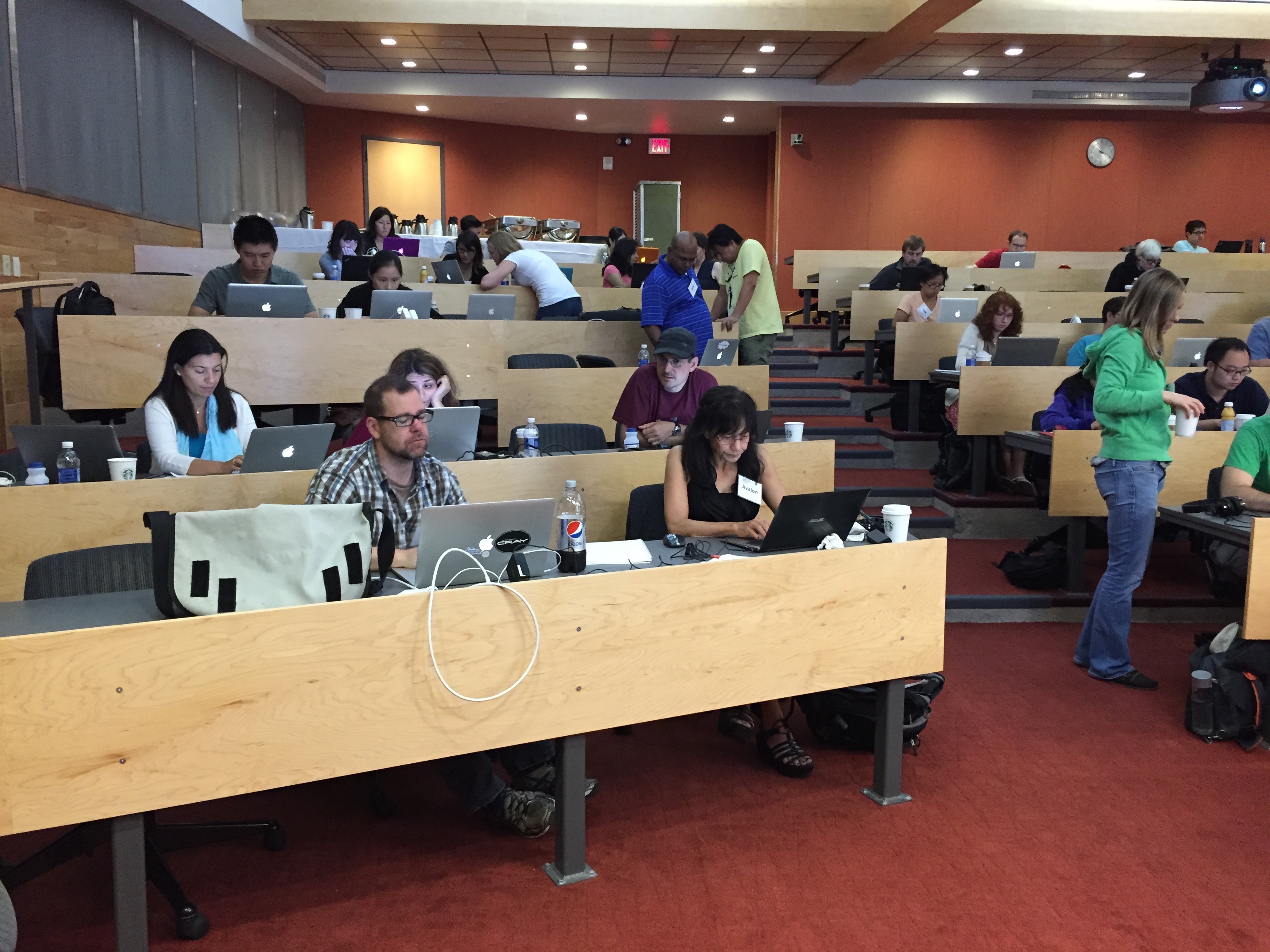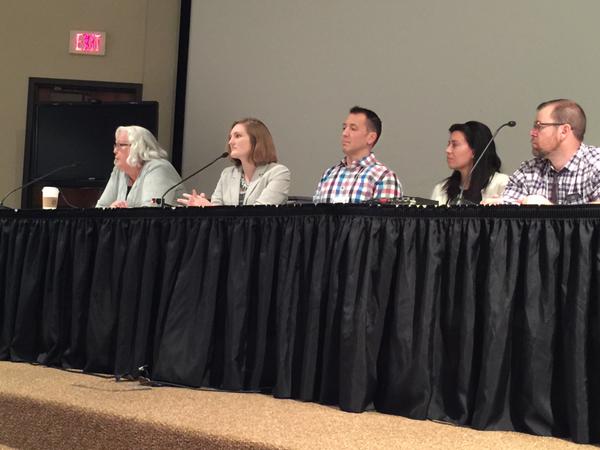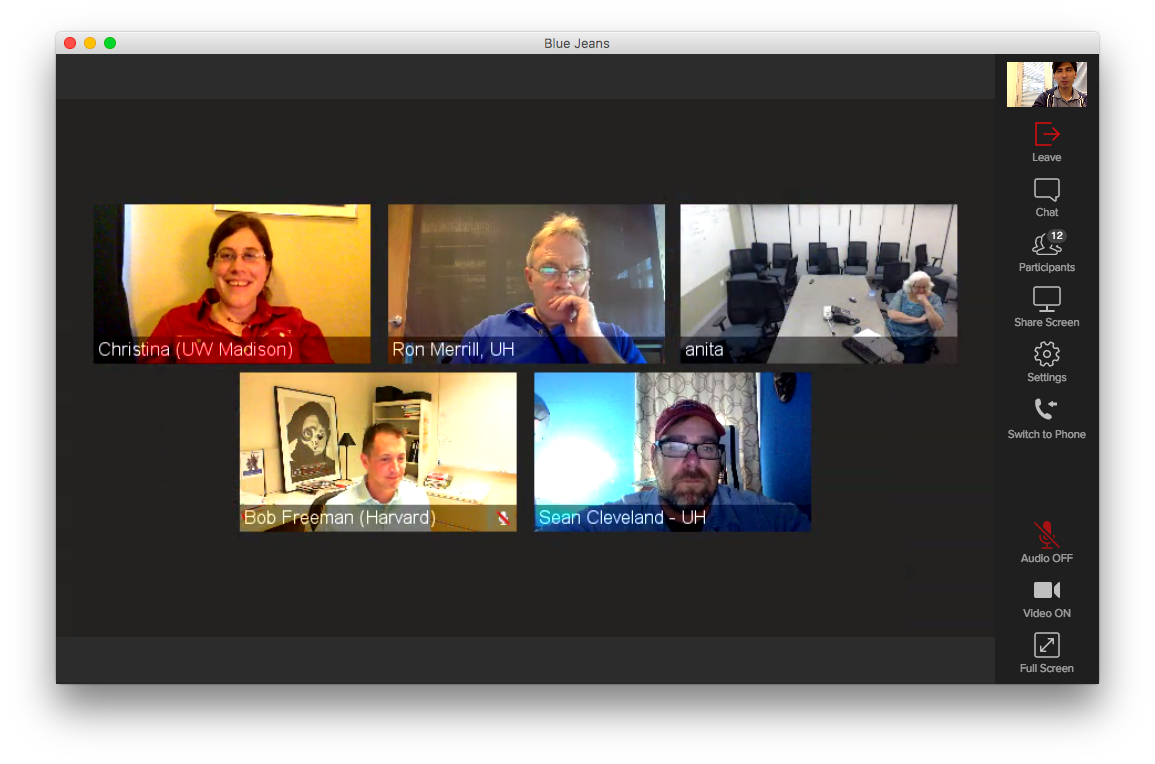 Enhancing ACI Knowledge
Enhancing ACI Knowledge
Proactively and reactively identifying available ACI resources. Gaining necessary knowledge and skills relevant to ACI resources.
- Introduction
- Trainings and Professional Development
2.1 Vendors
2.2 Conferences - Online Resources
3.1 Existing Documentation of Resource Providers
3.2 Social Networks and Professional Organizations
3.3 Journals, Blogs and Trade Magazines - Using Connections With Other ACI Staff/Facilitators
Introduction
To effectively support researchers who work on the cutting edge and push the technological envelope, Facilitators too must keep up to date with current and emerging technologies. Facilitators should work to achieve at least a basic knowledge of the latest hardware and software relevant to ACI services, and to understand its utility and impact in the context of the research community for which they provide a service. Just as a Facilitator provides ACI training opportunities for researchers, they too must attend workshops, participate in networking groups, and look for other professional training opportunities to supplement their existing knowledge of ACI. They should also seek out and review newly developed learning materials, for both existing and emerging ACI resources, for the purpose of identify potential on-site trainings for their communities. Staying current can be a challenge, with numerous updates and releases throughout the year, and especially if these activities are not explicitly scheduled as part of a facilitator’s duties, so devoting time to this pursuit, each week if possible, but at a minimum each month, is highly recommended.
In addition to seeking information to enhance one’s own knowledge of ACI, facilitators should also look for existing resources and materials that can be used by their research user community. Examples of these kinds of materials are listed in the following sections, and may overlap with the tutorials and documents listed as resources for facilitator training
The rest of this chapter discusses resource types and specific strategies for staying current with ACI resources as a Facilitator.
Trainings and Professional Development
 ACI-REFs being trained at the Open Science Grid (OSG) User School
ACI-REFs being trained at the Open Science Grid (OSG) User School
In addition to studying online resources and published materials on their own, it is recommended that Facilitators participate in professional development opportunities that combine learning and professional networking. Participation should focus on areas that are of interest to the facilitator and will also benefit the institution. Ideas for areas to pursue professional development and training for ACI facilitators are:
- Teaching: Facilitators should continue to update their skills in teaching and learn the current trends and best practices to make trainings more beneficial for researchers.
- Public speaking and presenting: In line with teaching methods, improving presentation skills provides benefits not just in training but at conferences and over venues where facilitators need to communicate.
- Grant writing: Many facilitators work in research institutions where grant funding is common so learning or enhancing grant writing skills is important.
- ACI Software: Enhancing skills with existing software tools at the institution or learning how to use new tools is important in supporting and serving the research community in their use of similar tools.
- ACI Hardware: Some facilitators work with ACI hardware for compute, storage and visualization so it is important to keep those skills and certifications current.
- ACI System Management: In keeping the ACI resources healthy and functional there are a number of tools that are specific to making this more manageable and efficient.
Many of the in-person professional development available to facilitators are provided by vendors and through conferences and are discussed further in this section.
Vendors
Training opportunities are often also available through ACI hardware and software vendors. Most of the hardware and some of the software utilized in ACI is sold by commercial vendors whose sales teams are often incentivized to help advertise their products by providing product training for their customers. These trainings typically occur at workshops in conference settings and are most useful when the vendor has a worthwhile training module that enhances a facilitator’s understanding of how to utilize the product to accelerate or advance research and is relevant to the targeted community. If there is already a relationship with a vendor, for a product that the institution has acquired or that the research community is using, or if the institution plans to make new or additional purchases, the Facilitator can usually work with the vendor to produce a quality training opportunity.
In addition to trainings, vendors can provide information about upcoming products that may offer a glimpse of the direction the industry is heading, for similar products and services. Having a good working relationship with vendor representatives can keep Facilitators informed about current technology, in addition to providing existing product updates and improvements. This usually requires no more than a simple subscription to a mailing list or company newsletter. Information can also be directly solicited from vendors to enhance a facilitator’s personal knowledge or relationship with a representative, for example, to request the vendor’s participation in training events, to enhance potential offerings at an ACI site.
Conferences
Academic conferences are an important venue for networking and knowledge exchange among researchers and other domain experts. . They are often the place where cutting edge ACI is presented and published in the conference proceedings. There is great opportunity for learning at these events, both interpersonally and professionally, and ideas can often be brought back to the Facilitator’s institution and applied in their own work and facilitation. In addition to meeting and learning from others, conferences provide many opportunities for sharing a Facilitator’s own experiences and research, by submitting a poster or presentation abstract, or by contributing to an organizational presence, for example, if the Facilitator’s institution has an exhibition booth.
Attending conference presentations is a good way to learn and improve skills and knowledge in a new field or area of interest. It is a good opportunity to engage with the work of others — to ask questions and to talk with presenters, or participants after a panel. Like any other profession, interpersonal networking is important for ACI facilitation. This is also a potential avenue for making contacts that may lead, for example, to being invited to join collective research projects and grants.
Another opportunity for meeting other Facilitators and becoming known in academic circles is to organize a panel session at one of the conferences. Knowing the appropriate individuals to ask for assistance will make a Facilitator more effective. Facilitators are encouraged to write to others in their field to propose a panel, birds-of-a-feather (BOF) session, or meetup event. These kinds of sessions provide opportunities for interpersonal engagement and organized discussions of current topics with a wide-range of practitioners in the topic area.
Some examples of ACI conferences that have been beneficial for current ACI facilitators are:
- XSEDE annual conference
- Advanced Research Computing Consortium (ARCC) meeting
- HTCondor Week
- Supercomputing (SC) conference
- Open Science Grid All-Hands meeting
- Internet2 conferences
 ACI-REF panel session at the Advanced Research Computing Consortium (ARCC) meeting
ACI-REF panel session at the Advanced Research Computing Consortium (ARCC) meeting
There are a variety of conference opportunities to choose from and all have the potential to be beneficial if relevant organizations, content and people are present. Keep in mind the benefit of the conference as well as the discussions amongst peers when considering what to attend. Some of the more impactful professional development and training opportunities available at conferences can also occur during the days preceding the conference, as half or whole day tutorial and workshop events,which often have a broader focus than the single topic short sessions of the technical conference.
Online Resources
The easiest way to stay current with new developments in ACI is through the many existing online communities. Most announcements, updates, news articles and other publications are first released on websites, in regular emails, and within community forums. Beyond the reading materials, there may be online video tutorials and self-paced trainings published by various ACI experts that may guide facilitators to new and popular areas of interest. Furthermore, these online resources can be a starting point for finding collaborators in some of the emerging ACI communities, and for learning about relevant face-to-face workshops and conference opportunities.
The rest of this section provides the main categories of online resources that should be considered and some examples of existing resources that have been deemed helpful by others in the ACI community.
Existing Documentation of Resource Providers
Many organizations and institutions have been creating and contributing to a large body of ACI knowledge for decades. The resources are of varying quality and states of maintenance, but using them can be more efficient than creating in-house materials from scratch and can highlight relevant focus areas. To aid in bootstrapping new Facilitators, a compilation of broad ACI documentation and training can be found in this chapter, in addition to a list that will continue to grow on the http://aciref.org website.
Listing of Training Resources:
On-Demand Tutorials:
- Open Science Grid User School - http://opensciencegrid.org/UserSchool
- OSG Connect Helpdesk - https://support.opensciencegrid.org/support/home
- NCSA Cyberinfrastructure Tutor - https://www.citutor.org/browse.php
- Cornell Virtual Workshop - https://cvw.cac.cornell.edu/topics
- Virtual School of Computational Science and Engineering - http://www.vscse.org/
- HPC University - http://hpcuniversity.org/trainingMaterials/
- ARCHER Virtual Tutorials - https://www.archer.ac.uk/training/virtual/index.php
- Wolfram Training: HPC Courses - https://www.wolfram.com/training/courses/hpc/
- PRACE Tutorials - http://www.training.prace-ri.eu/tutorials/index.html
- LLNL HPC Trainings - https://computing.llnl.gov/?set=training&page=index
- NCI Trainings - http://nci.org.au/user-support/training/
- SCAI Online Training - http://www.hpc.cineca.it/content/online-training
- Georgia Tech HPC Course - https://www.udacity.com/course/high-performance-computing--ud281
- HLRS HPC Online Workshops - https://fs.hlrs.de//projects/par/par_prog_ws/
- ACM SIG HPC - http://sighpceducation.acm.org/resources.html
- University of Washington HPC Course - http://faculty.washington.edu/rjl/uwhpsc-coursera/
- NVIDIA Courses - https://developer.nvidia.com/educators/existing-courses
- Software Carpentry - http://software-carpentry.org/
- Data Carpentry - http://www.datacarpentry.org/
The examples provided for existing documentation resources providers not exhaustive. They are intended to provide concrete examples of documentation and training materials that current facilitators find relevant.
Social Networks and Professional Organizations
Social media is a popular way to keep up with technological trends, as news is readily posted by information providers. There are pros and cons to its use: Its immediacy is beneficial in fast-paced arenas like research and technology, however, the content is customarily not peer reviewed, nor is there a guarantee of quality. With those caveats in mind, facilitators can begin reaping the benefits of social networks by joining various sites such as LinkedIn or Researchgate, which are aimed at professional and research communications. Examples of LinkedIn groups include:
- HPC - https://www.linkedin.com/topic/high-performance-computing
- Cloud Computing - https://www.linkedin.com/groups/61513/profile
- Women in HPC - https://www.linkedin.com/groups/8105215/profile
- Multicore and Parallel Computing - https://www.linkedin.com/groups/1156517/profile
- CUDA Developers - https://www.linkedin.com/groups/1956294
Before social media, professional organizations commonly provided an outlet for networking with colleagues and learning of updates and the latest trends. Most organizations have transitioned to social media and may have a presence on numerous social media platforms, but still maintain their own sites and offline presence as well. There can be additional benefits to becoming a member of these sites, as well as opportunities for participating in committees and governance groups. Some examples of professional organizations that current ACI facilitators find useful are listed below:
- ACM SIG HPC - http://sighpceducation.acm.org/
- XSEDE Campus Champions - https://www.xsede.org/campus-champions
- HPC Society - http://www.hpcsociety.org/
- IEEE - http://www.ieee.org
- SIAM - http://www.siam.org/
- Software Carpentry Contributors - http://software-carpentry.org/about/
- Data Carpentry Contributors - http://www.datacarpentry.org/involved/
The examples provided for social media and organizations are not exhaustive. They are intended to provide concrete examples that can be used to gauge the utility of further and future sites, as they arise or are discovered.
Journals, Blogs and Trade Magazines
In academia, the scientific journal has been the classic repository for knowledge and discovery. However, blogs and trade magazines also offer a gateway and enhancement to journal publications. These platforms frequently offer ACI facilitators materials for learn about the current trends of ACI as well as the current research taking place.
A list of suggested materials that is not exhaustive can be found in this section and on the ACI-REF website.
Journals and magazines
- The Journal of Supercomputing - http://www.springer.com/computer/swe/journal/11227
- Go Parallel - http://goparallel.sourceforge.net/
- ACM Special Interest Group on High Performance Computing: Digital Library - http://www.sighpc.org/resources/dl
Blogs
- HPC Wire - http://hpcwire.com
- Inside HPC - http://insidehpc.com/
- The Register, Data Center : HPC - http://www.theregister.co.uk/data_centre/hpc/
- HPC Notes - http://www.hpcnotes.com/
- ACM Special Interest Group on High Performance Computing - http://www.sighpc.org/
Vendor blogs and publications
- Cray Blog - http://www.cray.com/blog/
- Dell HPC Blog - http://en.community.dell.com/techcenter/high-performance-computing/
- Cisco HPC Blog - http://blogs.cisco.com/tag/hpc
- SGI Blog - http://blog.sgi.com/
- Puget Systems HPC Blog - https://www.pugetsystems.com/all_hpc.php
- Mellanox HPC Blog - http://www.mellanox.com/blog/category/hpc/
- Microsoft HPC Blog - https://blogs.technet.microsoft.com/windowshpc/
The examples provided for journals, blogs and magazines are not exhaustive. They are intended to provide concrete examples of materials that current ACI-REFs find useful.
Using Connections With Other ACI Staff/Facilitators
 ACI-REFs participating in a video conference call
ACI-REFs participating in a video conference call
Neither science nor facilitation take place in a vacuum. It takes an academic village, where villagers know one another and work together, to foster inquiry and research. These villages, or communities of practice, consist of professional and subject matter networks. Similarly, connecting with other ACI facilitators and researchers is an opportunity for the exchange of ideas and knowledge about the many aspects of ACI. These exchanges can enhance a Facilitator’s existing knowledge and advance their professional growth.
However, networking requires an investment in time and many facilitators already have little to spare. Ideally, they will choose networks that provide the most benefit, and can do so by looking for networks that meet the following criteria:
- The network has a common and defined interest/goal
- The network is active via electronic communication (slack, email, forum etc)
- The network follows a regular schedule for conference calls or virtual interactions
- The network meets periodically at conferences for face-to-face interactions
- The network is positive in communications about the subject of interest but also able to be constructively critical
Some professional networks that meet the above criteria and are related to ACI are:
- Campus champions - https://www.xsede.org/campus-champions
- Internet 2 - http://www.internet2.edu/communities-groups/members/
- ACI-REF - http://aciref.org
Not to overlook the local resources at a facilitator’s disposal, networks can also be internal to an institution and the facilitator should inquire about local groups or initiatives for faculty, staff and graduate student researchers. These types of networks offer institutional knowledge exchange, both historical and contemporary, which can be useful technically, but are especially helpful for understanding the institutional atmosphere. In addition to these more formal networking opportunities, there may also be less formal intra- or inter-departmental events such as luncheon meetings with colleagues, and faculty or visiting researcher presentations. The next chapter on Facilitating Research Connections takes a more in depth look at making connections and covers promoting opportunities for peer-learning between researchers, aiding in the formation of collaborations and liaising and matchmaking between users and ACI resource providers.
Jump to: top